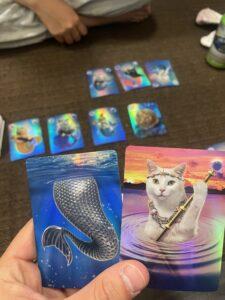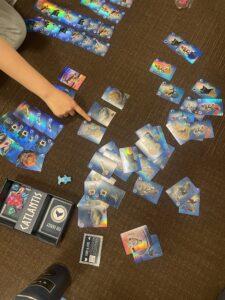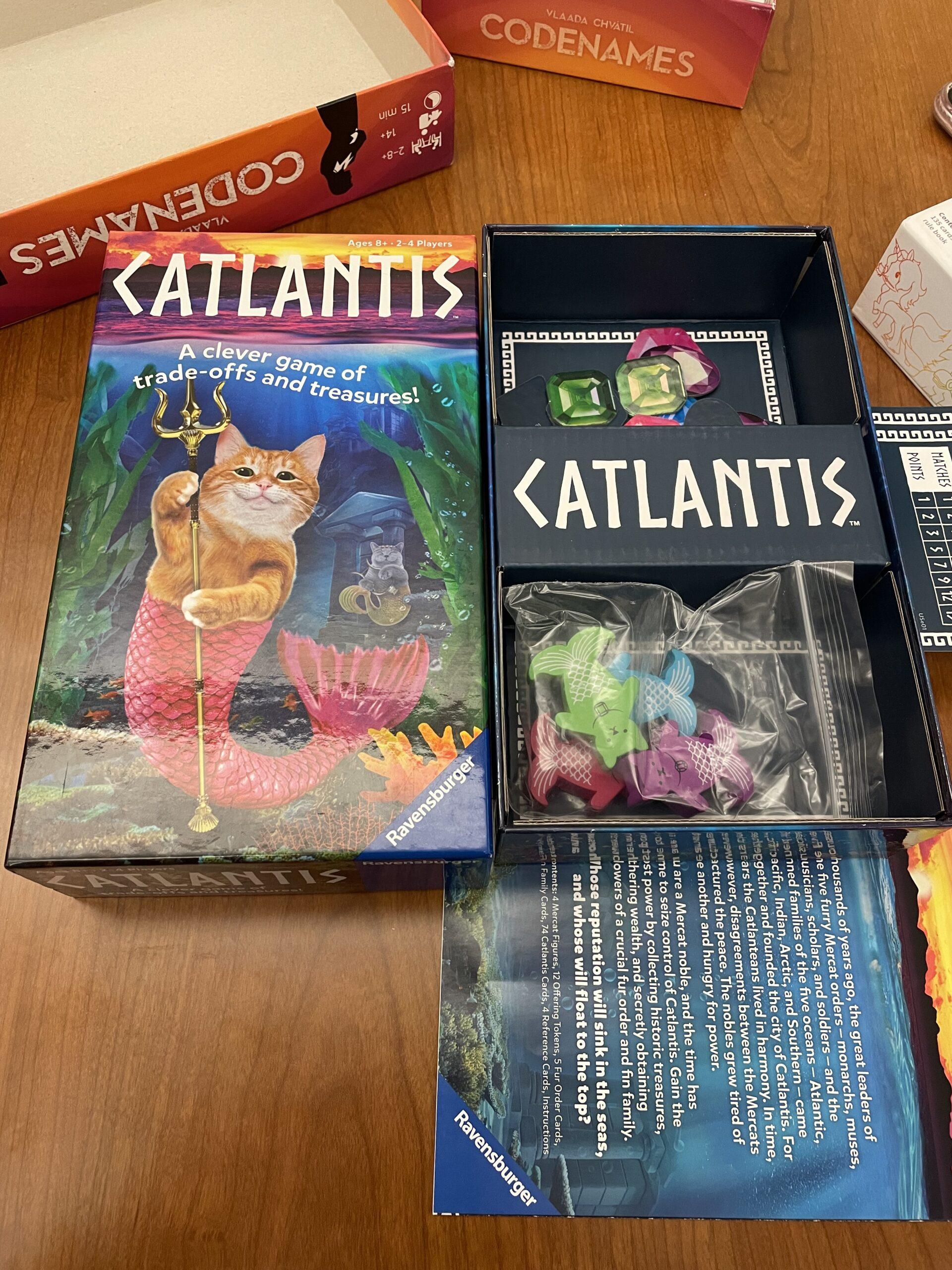This week, I sat down to play Catlantis, a pun-filled card game primarily targeted towards families and younger audiences (age 8+). The game, which was designed by Prospero Hall and published by Ravensburger, combines simple mechanics with a fun, unique premise of “mercats” and their underwater politics. It is a deck builder game, where players must strategically offer and pick cards to end up with the most points when the pile runs out. In this respect, it shares similarities and differences with the game my group is working on (I Will Be President), making it a good candidate for this week’s playtest. Ultimately, I’d argue that Catlantis comes short of similar games in terms of mechanics, with the gameplay feeling somewhat repetitive—especially in a group of two. However, Catlantis makes up for this with a wonderful premise and loveable artistic design that elevate the game to an entertaining play.
Firstly, let’s discuss the similarities to my group’s game, I Will Be President. In our game, players are given character cards, which establish who they are and what policy cards they must collect in order to win. Catlantis has a similar mechanic, with players receiving a type of cat and mermaid tail that they must collect throughout the game. Furthermore, the objective of the game is to collect the most points, which are essentially the same as “votes” in I Will Be President. There are three types of cards which assign points: coins (which grant points outright), cats (which grant points if they are of the correct type), and treasures (which grant points if you have the most of them).

This system, while novel at first, proves slightly too simple to keep gameplay intriguing. On my first playthrough, I noticed that the game started to drag halfway through, as we repeatedly pushed cards towards each other in silence, waiting for the deck to be finished. At the same time, this is a game targeted to younger audiences, so I can see why simpler gameplay (as compared to Sushi Go, or Catan) would help keep the game accessible. However, in I Will Be President, we hope to avoid this air of repetition by introducing more types of cards, as well as a board for more variety in gameplay. Instead of just placing cards, players will get to move pieces around the board, tally votes, and deal with policies that grant point multipliers, random events, or sabotage other players. Ideally, this variety will help avoid repetitive gameplay.
Perhaps the most unique procedure/rule in Catlantis was its card offering system. Instead of getting a hand directly from the deck (like in Sushi Go or Spoons), players choose two cards from the four at the table’s center, and offer them to another player. This player, in turn, picks the one they desire, and returns the other to the hand of the offering player. Having never played with this mechanic before, I found the offering system to be a fascinating method of building hands. In my second playthrough, my partner and I began to experiment with the strategy of the game, making offerings that would benefit us no matter which card the other chose. Overall, this system did have flaws, however. Most notably, it did not work so well in a group of two, which is how I played the game. In fact, this likely contributed to the game’s feeling of repetitiveness. While the box listed 2-4 players (like our game will), I found that gameplay varied considerably depending on how many players were at the table. As my group continues to refine our prototype, this is something I want to keep in mind: we should aim for consistent gameplay, no matter the number of players.


In terms of artistic design, Catlantis demonstrates that mechanics are not everything when it comes to game design. In fact, most of the uniqueness the game has to offer comes from its cute depictions of meerkats and the shiny treasures they collect. This is a quality we hope to emulate with I Will Be President, as the game revolves heavily around the premise of a presidential election, which we hope will help give some excitement and stakes to the competition.
Overall, playing Catlantis offered great insights into the game design process and some of the challenges that we want to address with I Will Be President. For one, it demonstrated that there is a delicate balance between simple game mechanics which make a game approachable, and having enough complexity to keep a game interesting. Furthermore, it illustrated that fun artistic design can help keep a game fresh and appealing, even in the face of repetitive gameplay. As my group continues the design process, these important insights will help to guide us forward.




